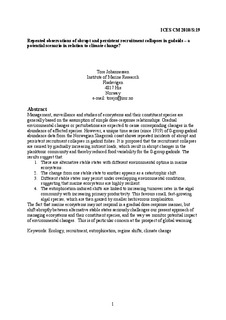| dc.description.abstract | Management, surveillance and studies of ecosystems and their constituent species are
generally based on the assumption of simple dose-response relationships. Gradual
environmental changes or perturbations are expected to cause corresponding changes in the
abundance of affected species. However, a unique time series (since 1919) of 0-group gadoid
abundance data from the Norwegian Skagerrak coast shows repeated incidents of abrupt and
persistent recruitment collapses in gadoid fishes. It is proposed that the recruitment collapses
are caused by gradually increasing nutrient loads, which result in abrupt changes in the
planktonic community and thereby reduced food variability for the 0-group gadoids. The
results suggest that:
1. There are alternative stable states with different environmental optima in marine
ecosystems.
2. The change from one stable state to another appears as a catastrophic shift.
3. Different stable states may persist under overlapping environmental conditions,
suggesting that marine ecosystems are highly resilient.
4. The eutrophication-induced shifts are linked to increasing turnover rates in the algal
community with increasing primary productivity. This favours small, fast-growing
algal species, which are then grazed by smaller herbivorous zooplankton.
The fact that marine ecosystems may not respond in a gradual dose-response manner, but
shift abruptly between alternative stable states seriously challenges our present approach of
managing ecosystems and their constituent species, and the way we monitor potential impact
of environmental changes. This is of particular concern at the prospect of global warming.
Keywords: Ecology, recruitment, eutrophication, regime shifts, climate change | no_NO |
